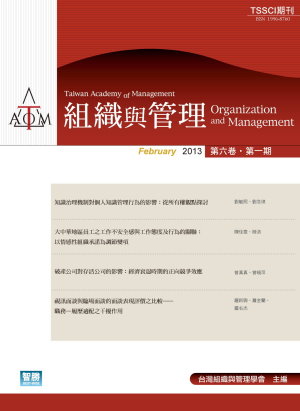Hot News
| 中文篇名 |
大中華地區員工之工作不安全感與工作態度及行為的關聯:以情感性組織承諾為調節變項 | |
|---|---|---|
| 英文篇名 |
The Associations among Job Insecurity, Work Attitudes, and Work Behaviors in the Greater China Region: Affective Organizational Commitment as a Moderator | |
| 作者 | ||
| 中文摘要 |
本研究主要站在與西方壓力理論對話的立場,以非西方國家為樣本,探討:一、工作不安全感與工作態度及行為(工作滿意與工作績效)之間的關聯;二、情感性組織承諾對工作不安全感與工作態度及行為之關係的調節效果。本研究採用結構式問卷調查,共計完成380份有效問卷,調查對象為大中華地區各類組織之全職工作者。研究結果發現,對兩岸三地的員工而言,工作不安全感與工作滿意及工作績效等變項間皆有顯著負相關。有趣的是,當我們進一步將次文化差異納為考量則發現,情感性組織承諾對工作不安全感與工作績效之關聯有不一致的調節效果。對香港員工而言,情感性組織承諾會強化工作不安全感與工作績效的負向關聯;對北京員工而言,情感性組織承諾會緩和工作不安全感與工作績效的負向關聯。是此,本研究建議未來可以其他非西方樣本做為分析對象,進行更深入的相關研究,並留意次文化差異對員工所產生之一種壓力反應與另一種反應間的可能影響。 | |
| 英文摘要 |
From the perspective of East-West differences in stress experiences, the current study explored: 1) the associations among job insecurity, work attitudes (job satisfaction) and behaviors (job performance); and 2) the possible moderating effect of affective organizational commitment on the above relationships among employees in the Greater China region. Using structured questionnaires, a diverse sample of 380 full-time employees drawn from a variety of organizations in Taiwan, Hong Kong and mainland China was surveyed. | |
| 關鍵詞 |
工作不安全感、工作滿意、工作績效、情感性組織承諾、job insecurity、job satisfaction、job performance、affective organizational commitment | |
| 刊名 | ||
| 期數 | ||
| 起訖頁 |
59-92 | |
| 出版單位 | ||
| DOI | ||
| QRCode |
| |
| 上一篇 | ||
| 下一篇 |



